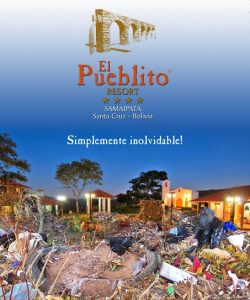
Problem
This advertisement is for a resort outside of the city of Santa Cruz, Bolivia. ‘Simplemente inolvidable’ translates to ‘Simply Unforgettable’. Santa Cruz is one of the largest cities in Bolivia. It houses a vibrant urban, upper class community in its centre, quite a contrast to the urban poor that is sandwiched between this and the resorts at the far outer ring. Stretching further there are pockets of smaller communities, distinct from Santa Cruz. These communities often lack economic resources for social development such as educational facilities and are often victims of environmental degradation. Most urban areas in Bolivia lack a proper recycling and waste disposal program. Similar to many other parts of the world, the wealthy are able to garner in the earth’s riches, living in clean facilities, while the populous’ waste does not immediate effect them as it is disposed far from their vicinity. Often, the wealthy choose to spend their free time in resorts, such as El Pueblito in Santa Cruz.
Wealth derived from resource extraction in Bolivia amounts to a large portion of Bolivia’s economy, though the gains are more internal, moving away from an ‘extractivist’ vision (Fuentes). Though this is not directly related to this advertisement, I would like to take a moment to appreciate the irony of people who participate in resource extraction, and then proceed to go to a resort the appreciates the beauty of the landscape. Of course, in our present economy resource extraction is often necessary, but there is often a history of extorting the locals for their land without proper compensation and sometimes the extraction sites lack proper environmental standards (Westra).
Nevertheless, this ad invokes a sense of isolationism for the upper classes – a retreat (as resorts typically are) from the rest of society, where one can socialize with like minded individuals in peace. For this assignment I will attempt to interrupt this narrative of elitism, and pointing out that waste is everyones responsibility.

Jamming Philosophy
A few years ago I was living and working in Camiri, Bolivia, which is a few hours south of Santa Cruz. Staying with fellow university students (who soon became good friends) we were working on a project to address the poor waste disposal services in the smaller communities. Many of the smaller communities receive waste from the larger cities, particularly in the outlying areas.
To ‘jam’ this advertisement, I used photoshop, and layered an image of a ‘dump’, which is really just a cliffside where trucks come by and drop waste. This waste ends up in streams and rivers, which individuals rely on for water and recreation. The sources of the waste is not apparent in the ad, but I hope that it becomes apparent that waste is not something that will disappear without proper disposal.
Additionally, the message of the advertisement remains the same – ‘Simply Unforgettable’ – as waste should be the entire planets responsibility, and the wealthy should not have the luxury to be an exception to this rule. Building off of the theory of life cycle thinking for waste management, this ad addresses how environmental degradation normally targets the most socially and economically vulnerable in our society (Life Cycle Thinking). By turning this light towards what it would look like if it effected the spaces considered ‘refined and luxurious’, as in reality, waste effects everyone, even if it is not directly noticeable in our visual field.
References
Fuentes, Frederico. “Bolivia And The Large Scale Extraction Of Natural Resources”. Global Research. N.p., 2014. Web.
“Life Cycle Thinking And Assessment For Waste Management”. EC Europa. N.p., 2008. Web.
Westra, Laura. Environmental Justice And The Rights Of Indigenous Peoples. London: Earthscan, 2008. Print.